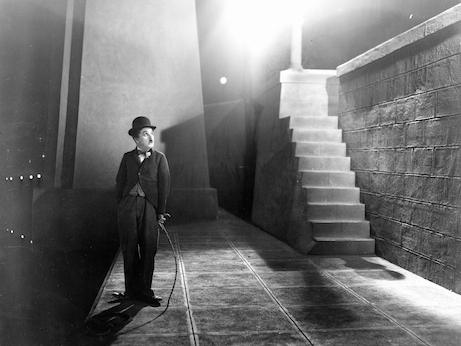
This page is to obtain ONLINE access to the Sands Films Cinema Club presentation of City Lights on Tuesday 13th December
To attend in person, please CLICK HERE
Still silent despite the advent of sound, Chaplin now gave his most moving performance. Of course, he had the benefit of brilliant writing and directing: his own. City Lights is the seminal American movie of the Great Depression.
Chaplin’s vagrant draws kindness from the girl he loves, a flower peddler whose blindness perhaps spares them both her judging his circumstance. Their lives are precarious. Charlie, homeless, routinely skirts starvation, and the girl, who supports her mother, with whom she shares a tiny apartment, is threatened with eviction. Charlie has crossed paths with a rich playboy whose life, luckily, he saved on the occasion of one of the playboy’s frivolous suicide attempts—foolishness that stands in sharp contrast to the real hardship of others. Not so luckily, though, the playboy is generous only when drunk, which is also when he attempts suicide, but mean and stingy the morning after: a telescoping of society’s ambivalent feelings about the poor. Charlie’s goal to help the blind girl takes him from sweeping streets into the boxing ring, where he is hilariously ill suited, to committing a robbery in order to pay for a surgical operation that might restore the girl’s sight. Released from prison, he chances across his beloved again. Now she is the proprietor of a flower shop, and she can see him for the first time. This is her benefactor—Charlie the Tramp. How he appears, her new status now dividing them: Will she be grateful only? Can she love Charlie? By dint of the film’s closing fadeout, we will never know.
Thus Chaplin finds a perfect metaphor for the uncertainties of the time. Ambiguous, poignant, haunting, this celebrated ending releases such powerful, complex feeling as to give fresh meaning to the idea of the bittersweet.
Dennis Grunes

This page is to obtain ONLINE access to the Sands Films Cinema Club presentation of City Lights on Tuesday 13th December
To attend in person, please CLICK HERE
Still silent despite the advent of sound, Chaplin now gave his most moving performance. Of course, he had the benefit of brilliant writing and directing: his own. City Lights is the seminal American movie of the Great Depression.
Chaplin’s vagrant draws kindness from the girl he loves, a flower peddler whose blindness perhaps spares them both her judging his circumstance. Their lives are precarious. Charlie, homeless, routinely skirts starvation, and the girl, who supports her mother, with whom she shares a tiny apartment, is threatened with eviction. Charlie has crossed paths with a rich playboy whose life, luckily, he saved on the occasion of one of the playboy’s frivolous suicide attempts—foolishness that stands in sharp contrast to the real hardship of others. Not so luckily, though, the playboy is generous only when drunk, which is also when he attempts suicide, but mean and stingy the morning after: a telescoping of society’s ambivalent feelings about the poor. Charlie’s goal to help the blind girl takes him from sweeping streets into the boxing ring, where he is hilariously ill suited, to committing a robbery in order to pay for a surgical operation that might restore the girl’s sight. Released from prison, he chances across his beloved again. Now she is the proprietor of a flower shop, and she can see him for the first time. This is her benefactor—Charlie the Tramp. How he appears, her new status now dividing them: Will she be grateful only? Can she love Charlie? By dint of the film’s closing fadeout, we will never know.
Thus Chaplin finds a perfect metaphor for the uncertainties of the time. Ambiguous, poignant, haunting, this celebrated ending releases such powerful, complex feeling as to give fresh meaning to the idea of the bittersweet.
Dennis Grunes